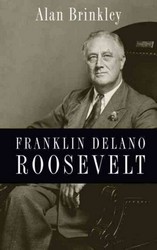Roosevelt Book
|
| updated |
Copy Link Code
|
 There could never be a politician as well-known and loved as Franklin Delano Roosevelt without drawing the interest of historical authors. Roosevelt's long presidency came at a crucial time in American history, the ending of one world war, the duration of another, and a depression so volatile that it took years for the country to recover.
There could never be a politician as well-known and loved as Franklin Delano Roosevelt without drawing the interest of historical authors. Roosevelt's long presidency came at a crucial time in American history, the ending of one world war, the duration of another, and a depression so volatile that it took years for the country to recover.
While there are hundreds of "Roosevelt books" that have been written since his death, the four discussed below are recommended, because they so adequately cover the man and his mission. Each of these authors explores Roosevelt's life and his contributions.
- The Lion and The Fox, James MacGregor Burns (Harcourt, Brace 1956): This book has long been considered one of the most reliable biographies about Franklin Roosevelt from 1882 through the beginning of World War II. Aside from an in-depth look at America's greatest politician of the twentieth century, Burns also provides a study of the political machine during the same time period. Its title is based on Machiavelli's maxim that a person must be as courageous as a lion but as sly as a fox to accomplish his goals, especially in the world of politics. He depicts Franklin Roosevelt as flush with these qualities - FDR could heartily defend his programs and push them through Congress while he convinced the public that his plan was the best alternative for them. This book about FDR is an excellent read for those interested in the development of the man and the politician.
- Roosevelt: The Soldier of Freedom, James MacGregor Burns (Harcourt, Brace, Jovanovich, 1970): This continuing biography of Roosevelt provides an insight into a crusader who easily and craftily adapted to global issues; it is a well-told account of Roosevelt's life and political activities from the end of his second term until his untimely death in 1945. Burns explains how Roosevelt convinced the American people that the U.S. had to enter World War II on behalf of Britain in order to preserve freedom, thus the book's title. Of most importance is the author's account of Roosevelt's ability to handle such diverse and at-odds leaders as Stalin and Churchill, as well as other powerful people engaged in a massive war for global control. Too, this book about Roosevelt continues to explore how the man was so successful at maintaining the loyalty of Americans while he led them through devastating resurging times of loss and rebuilding.
- A First-Class Temperament, Geoffrey Ward (Harper & Row, 1989): Ward offers a study about Roosevelt that reconnoiters the other side of a man finding his path to prominence on the political stage. This Roosevelt book explores his love of tradition and preservation of America's natural resources. Ward also writes about the defects, both in character and application, that Roosevelt possessed and how he used those defects to become one of the greatest political figures of all time. The author asserts throughout this book about Roosevelt that, in the modern day political and journalistic environment, FDR may not have had the public support that he enjoyed during his presidency due to the vastness of his social programs. This Roosevelt book is centered on the man and his personal life and how that life influenced his ability to lead a nation through some of the most challenging times of its history.
- Franklin D. Roosevelt: Champion of Freedom, Conrad Black (Public Affairs, 2003): This Franklin Delano Roosevelt biography assesses the man; it is about his personality and character rather than his politics and political career. Conrad Black is adept at recognizing Roosevelt's skills as a strategist and visionary and how he used his political acumen to manipulate and motivate his people. Black portrays Roosevelt as an ambitious and scheming person who was skilled at getting the better of his adversaries and his competitors. However, the book's critics assail that the author fails to recognize the validity and contribution many of FDR's programs made to the recovery of the nation following the Great Depression and World War II. They say that, in this book about Roosevelt, Black failed to give the man credit for establishing the "era of the common man," which is what his long presidency signifies.
Two other significant books about Roosevelt are: Traitor to His Class: The Privileged Life and Radical Presidency of Franklin Delano Roosevelt by H. W. Brands (Anchor Books, 2008) and FDR by Jean Edward Smith (Random House Publishing Group, 2007). Each of these Roosevelt books explore the man and his mission as they related to that era and how Roosevelt's view of the government's role might be applied to today's world.
